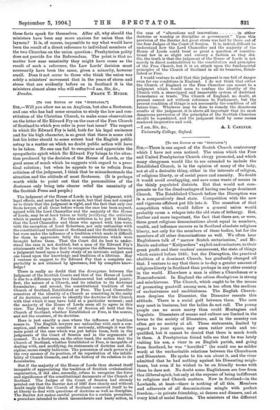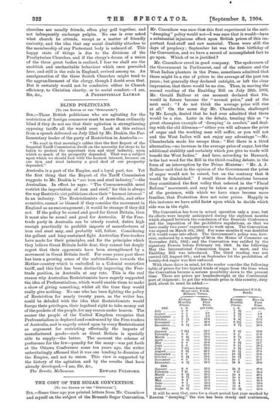[To THE EDITOR OF THE "SPECTATOR-1 STE,—There is one aspect
of the Scotch Church controversy which I have not seen noticed. The union which the Free and United Presbyterian Church clergy promoted, and which many clergymen would like to see extended to include the Established Church, is in the opinion of many of the laity, not at all a desirable thing, either in the interests of religion, of religious liberty, or of social peace and amenity. No doubt it would avoid overlapping, and save some waste of means in the thinly populated districts. But that would not com- pensate us for the disadvantages of having one large dominant Church. The Established Church before the Disruption was in a comparatively dead state. Competition with the new and vigorous offshoot put life into it. The cessation of that competition which would follow a general union would probably cause a relapse into the old state of lethargy. But, further and more important, the fact that there are, or were, three great religious denominations about equal in numbers, wealth, and influence secures us in Scotland absolute religious liberty, not only for the members of these bodies, but for the members of all other denominations as well. We often hear Englishmen talk of "narrow Scotch sectarianism," and Mr. Barrie and other " Kailyarders " exploit and caricature, to their great profit and their readers' amusement, the state of things which existed 'before 1843; but the Disruption, the practical abolition of a dominant Church, has gradually changed all that. I venture to say that there is to-day a greater amount of religious liberty in Scotland than perhaps in any other country in the world. Elsewhere a man is either a Churchman or a Nonconformist. In England the odium theologicum is strong and mischievous. The Church, which ought to be the means of promoting goodwill among men, is too often the medium of exclusiveness and snobbishness. The English Church- man despises the Dissenter, the Dissenter resents this attitude. There is a social gulf between them. The men may meet in business, but the ladies do not call. The young people can no more marry than could Monta.gues and Capulets. Dissenters of means and culture are limited in the towns to the society of Dissenters, and in the country can often get no society at all. These statements, limited by regard to your space, may seem rather crude and un- qualified, but it cannot be denied that there is much truth in them. A Presbyterian friend tells me that he was lately visiting his son, a vicar in an English parish, and going from Scotland, he was " horrified " (he could use no milder word) at the uncharitable relations between the Churchmen and Dissenters. He spoke to his son about it, and the vicar admitted that he had nothing against his Dissenting neigh- bours, but even if he wished to be on friendly terms with them he dare not. No doubt some Englishmen are free from this illiberal spirit, but only at the expense of being indifferent to religious and Church matters. Now in Scotland—in the Lowlands, at least—there is nothing of all this. Members and adherents of all denominations mingle with perfect freedom,—in private friendship, at dances and dinners, and at every kind of social function. The ministers of the different churches are usually friends, often play golf together, and not infrequently exchange pulpits. No one is ever asked what church he attends, except as a matter of friendly curiosity, and the idea that any social disability attaches to the membership of any Protestant body is unheard of. This happy state of things is due to the divisions of the Presbyterian Churches, and if the clergy's dream of a union of the three great bodies is realised, I fear we shall see the snobbish and uncharitable behaviour which once prevailed here, and still is the rule in England, revived among us. An amalgamation of the three Scotch Churches might tend to the aggrandisement of the clergy, though I doubt even that. But it certainly would not be conducive either to Church efficiency, to Christian charity, or to social comfort.—I am,







































 Previous page
Previous page